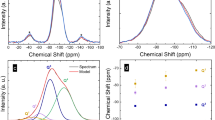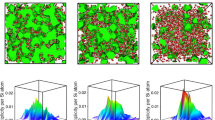Abstract
THE Poisson ratio of a solid characterizes its response to uniaxial stress. It is defined as the negative ratio of the transverse strain to the corresponding axial strain. Normally, this ratio is positive, as most solids expand in the transverse direction when subjected to a uniaxial compression. Although a negative Poisson ratio is not forbidden by thermodynamics, it is rare in crystalline solids: the results of recent experiments1 which observed a negative Poisson ratio in α-cristobalite were therefore unexpected. We have investigated the elastic behaviour of α-cristobalite and other forms of silica with first-principles calculations and classical interatomic potentials. Our calculations reproduce the negative Poisson ratio in α-cristobalite, and predict that α-quartz, the most common form of crystalline silica, will also exhibit a negative Poisson ratio under large uniaxial tension. We attribute the occurrence of a negative Poisson ratio in low-density silica polymorphs to the high rigidity of the SiO4 tetrahedra.
This is a preview of subscription content, access via your institution
Access options
Subscribe to this journal
Receive 51 print issues and online access
$199.00 per year
only $3.90 per issue
Buy this article
- Purchase on Springer Link
- Instant access to full article PDF
Prices may be subject to local taxes which are calculated during checkout
Similar content being viewed by others
References
Weidner, D. J., Yeganeh-Haeri, A. & Parise, J. Eos Trans. 71, 619 (1990).
Lempriere, B. M. Am. Inst. Aeronaut. Astronaut. J. 6, 2226–2227 (1968).
Love, A. E. H. A Treatise on the Mathematical Theory of Elasticity, 4th Edn 163 (Dover, New York, 1944).
Li, Y. Phys. Stat. Sol. 38, 171–175 (1976).
Grimvall, G. Thermophysical Properties of Materials, 62 (North-Holland, Amsterdam, 1986).
Landolt-Börnstein: Numerical Data and Functional Relationships in Science and Technology, new series V/1b (ed. Angenheister, G.) 33 (Springer, Berlin, 1982).
Tsuneyuki, S., Tsukada, M., Aoki, H. & Matsui, Y. Phys. Rev. Lett. 61, 869–872 (1988).
Keskar, N. R. & Chelikowsky, J. R. Phys. Rev. B (in the press).
Troullier, N. & Martins, J. L. Solid State Commun. 74, 613–616 (1990).
Troullier, N. & Martins, J. L. Phys. Rev. B43, 1993–2006 (1991).
Keskar, N. R., Troullier, N., Martins, J. L. & Chelikowsky, J. R. Phys. Rev. B44, 4081–4088 (1991).
Chelikowsky, J. R., King, H. E. Jr, Troullier, N., Martins, J. L. & Glinnemann, J. Phys. Rev. Lett. 65, 3309–3312 (1990).
Chelikowsky, J. R., Troullier, N., Martins, J. L. & King, H. E. Jr. Phys. Rev. B44, 489–497 (1991).
Wyckoff, R. W. G. Crystal Structures, 2nd edn, Vol. 1, 316–318 (Interscience, New York, 1964).
Stixrude, L. & Bukowinski, M. S. T. Phys. Chem. Miner. 16, 199–206 (1988).
Author information
Authors and Affiliations
Rights and permissions
About this article
Cite this article
Keskar, N., Chelikowsky, J. Negative Poisson ratios in crystalline SiO2 from first-principles calculations. Nature 358, 222–224 (1992). https://doi.org/10.1038/358222a0
Received:
Accepted:
Published:
Issue Date:
DOI: https://doi.org/10.1038/358222a0
This article is cited by
-
Auxetic behavior of 3D-printed structure made in acrylonitrile butadiene styrene and carbon fiber-reinforced polyamide
Progress in Additive Manufacturing (2023)
-
Experimental evidence of auxeticity in ion implanted single crystal calcite
Scientific Reports (2022)
-
Models and auxetic characteristics of a simple cubic lattice of spherical particles
Continuum Mechanics and Thermodynamics (2022)
-
First-Principles Calculations on Physical Properties of α-CoSn3 Intermetallic Compound and β-Sn/α-CoSn3 Interface
Journal of Electronic Materials (2021)
-
On the application of additive manufacturing methods for auxetic structures: a review
Advances in Manufacturing (2021)
Comments
By submitting a comment you agree to abide by our Terms and Community Guidelines. If you find something abusive or that does not comply with our terms or guidelines please flag it as inappropriate.



